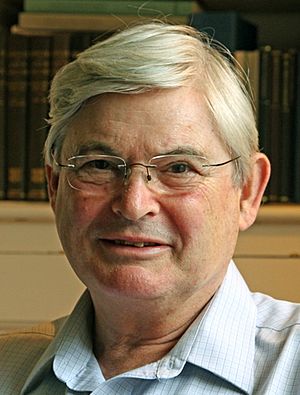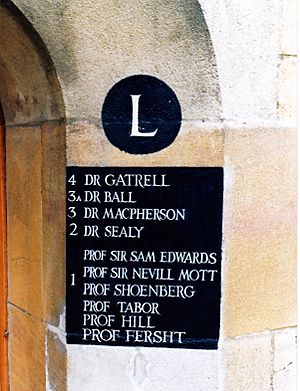Alan Fersht facts for kids
Quick facts for kids
Sir Alan Fersht
FRS FMedSci
|
|
|---|---|
 |
|
| Born |
Alan Roy Fersht
21 April 1943 London, England
|
| Education | Sir George Monoux Grammar School, University of Cambridge |
| Known for | Protein folding, Phi value analysis, Protein engineering, nucleation-condensation mechanism, double-sieve model of error correction, aminoacyl tRNA synthetases, specificity constant  |
| Spouse(s) |
Marilyn Persell
(m. 1966) |
| Awards |
|
| Scientific career | |
| Fields |
|
| Institutions | |
| Thesis | Intramolecular Catalysis of Ester Hydrolysis (1968) |
| Doctoral students | Sophie E. Jackson, Andreas Matouschek |
Sir Alan Roy Fersht (born April 21, 1943) is a famous British chemist. He works at the MRC Laboratory of Molecular Biology in Cambridge. He is also a Professor at the University of Cambridge. From 2012 to 2018, he was the Master of Gonville and Caius College, Cambridge.
Sir Alan is known for his work in protein science. He combines ideas from chemistry, molecular biology, and biophysics. Many people see him as a founder of protein engineering. This field involves changing proteins to understand how they work.
Contents
Early Life and Education
Alan Fersht was born in Hackney, London, on April 21, 1943. His parents, Philip and Betty, were tailors. His grandparents came to England from Poland, Lithuania, and Belarus.
He went to an all-boys school called Sir George Monoux Grammar School in London. He was very good at chess and even won a junior championship in 1961.
He earned a scholarship to study Natural Sciences at Gonville and Caius College, Cambridge. He received his PhD degree in 1968. He also played chess for the University of Cambridge.
Career and Discoveries
After his PhD, Sir Alan worked at Brandeis University in the United States for a year. In 1969, he returned to Cambridge. He became a group leader at the MRC Laboratory of Molecular Biology.
From 1978 to 1988, he was a professor at Imperial College London. He also spent time at Stanford University in the US. In 1988, he became a professor at Cambridge again. He led the Cambridge Centre for Protein Engineering from 1990 to 2010.
Understanding Enzymes
Sir Alan first studied how enzymes work. Enzymes are like tiny machines in our bodies that speed up chemical reactions. He helped explain how enzymes choose the right molecules to work on. He showed that a special number, called the specificity constant, helps measure how well an enzyme can pick out its target.
Protein Engineering
Sir Alan was one of the first scientists to use a new method called Recombinant DNA technology. This allowed him to change proteins. In 1982, he worked with Sir Gregory Winter to make the first engineered change in a protein. This was a big step for protein engineering.
Protein engineering helps scientists understand how proteins are built and how they do their jobs. Sir Alan used this method to study how proteins fold into their correct shapes.
How Proteins Fold
Proteins are long chains of molecules that must fold into specific 3D shapes to work correctly. Sir Alan developed a method called Phi value analysis. This method helps scientists figure out how proteins fold step-by-step.
His research showed that proteins fold very quickly. They collapse around a small starting point, like building a house from the inside out. This process is called "nucleation-condensation."
Proteins and Health
Sir Alan's work also looks at what happens when proteins fold incorrectly. This can lead to diseases. He also studies a protein called p53, which is important in fighting cancer. His research helps scientists find new ways to treat diseases like cancer.
Selected Publications
- Structure and Mechanism in Protein Science: A Guide to Enzyme Catalysis and Protein Folding
- The Selected Papers of Sir Alan Fersht: Development of Protein Engineering
Awards and Honours

Sir Alan Fersht has received many important awards for his work.
- In 1983, he became a Fellow of the Royal Society (FRS). This is a very high honor for scientists in the UK.
- The Royal Society gave him the Gabor Medal in 1991 for his work in molecular biology.
- He received the Davy Medal in 1998 for his chemistry research.
- In 2008, he was awarded the Royal Medal.
- In 2020, he received the Copley Medal, which is the Royal Society's oldest and most important award. This was for his work on protein folding.
He has also received honorary degrees from many universities around the world. In 2003, he was made a knight by the Queen for his important work in protein science.
Personal Life
Sir Alan Fersht married Marilyn Persell in 1966. They have a son and a daughter. In his free time, he enjoys playing chess, studying horology (the science of measuring time), and wildlife photography.
 | Dorothy Vaughan |
 | Charles Henry Turner |
 | Hildrus Poindexter |
 | Henry Cecil McBay |

